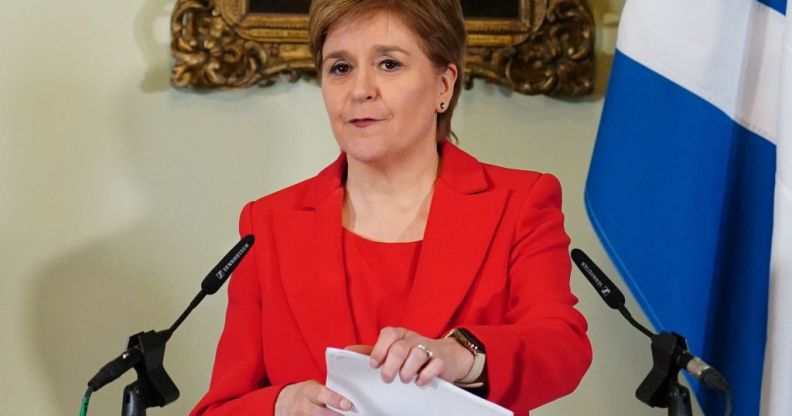Nicola Sturgeon denies resignation is over trans prisoners backlash

Scotland’s first minister, and leader of the Scottish National Party (SNP), Nicola Sturgeon, speaks during a press conference at Bute House in Edinburgh where she announced she will stand down as first minister. (Getty)
Announcing her resignation, Nicola Sturgeon made clear she hasn’t been forced out by anti-trans backlash.
Sturgeon confirmed on Wednesday (15 January) that she will step down once a new SNP leader and first minister has been chosen.
She suggested this will happen before the party’s upcoming special conference on independence on 19 March.
As soon as news broke that Sturgeon would be standing down, there was speculation it was the backlash to her stance on gender recognition that had pushed her to it.
Sturgeon has become the target of criticism for her support of trans rights, especially after the conviction of a trans woman, Isla Bryson, for rape, and her temporary incarceration in a women’s prison (Bryson was housed in a single cell while being assessed, and has since been moved to a men’s prison).
Sturgeon has argued against conflating the case with the topic of gender recognition, but critics and large parts of the media have done just that.
Speaking in Edinburgh, she said she was not resigning over “short term pressures”.
“When it comes to navigating choppy waters, resolving seemingly intractable issues or soldiering on when walking away would be the easier option, I have plenty of experience to draw on.”
When asked directly if the Bryson case was the “straw that broke the camel’s back”, Sturgeon said no.
“I’ve faced more short-term issues that I care to remember. if it was just that I wouldn’t be standing here today,” she said.
She said the decision comes from a “deeper and longer term assessment”, and that after eight years as first minister, the time is right for her to step aside.
“Giving absolutely everything of yourself to this job is the only way to do it,” she said. “The country deserves nothing less. But in truth that can only be done by someone for so long.”
Sturgeon suggested that people’s views of her were colouring their views on trans rights, and called for a more “rational” debate on equality.
She said that the debate around the Bryson case was “controversial”, but that “layered on top of that there have been views about me and independence and suddenly debates that should be rational, and that we should be capable of having rationally, become something very different”.
Sturgeon hopes that that her exit prompts all parties to “take this opportunity to depolarise public debate, just a bit, to focus on issues rather than personalities and to reset the tone and tenor of our discourse”.
Describing herself as a staunch feminist, she added: “I will always be a voice for inclusion, for equality, for human rights and dignity. And I will always be a feminist. I will fight for women’s rights and stand up against threats to women’s rights every day I have breath in my body. I’ll also stand up for any stigmatised, discriminated against, marginalised and vulnerable group in society.
“I am at heart an optimist. I believe these things must, in any progressive liberal society, find ways of co-existing. Whatever role I play in the futue I will do what I can to turn that into a reality.”
Sturgeon oversaw the passing of the Gender Recognition Reform (Scotland) bill, which would have simplified the process by which trans people can be recognised properly on their birth, death, marriage and civil partnership certificates.
It would not have introduced any new rights, but would have removed medical requirements from the gender recognition process, and would have lowered the age limit to 16.
After the bill was passed in Holyrood, it was blocked by Westminster. Sturgeon had announced her intent to challenge the blocking in court, but a case has not yet been lodged.
How did this story make you feel?

